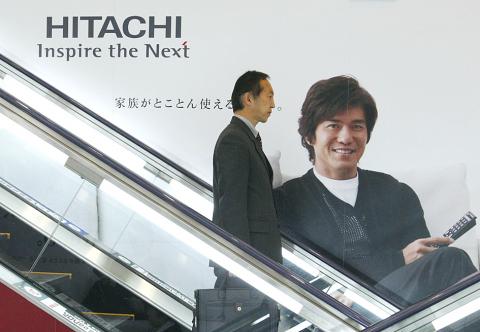Hon Hai Precision Industry Co (鴻海精密) shares gained in early Taipei trading after a Nikkei Shimbun report that the world’s largest contract manufacturing service firm for electronics and communication products plans to acquire control of a LCD venture between Japan’s Hitachi Ltd and Canon Inc for ¥100 billion (US$1.2 billion).
The stock advanced 0.4 percent to NT$117.50 as of 9:04am. The stock ended unchanged at NT$117 yesterday.
The companies are in final negotiations for Hon Hai to acquire ¥50 billion in each of two private offerings from the venture over the next two years, dropping Hitachi’s stake to 30 percent from 75.1 percent, according to the report.

PHOTO: REUTERS
The unit, Hitachi Displays, will use the funds to build a plant in Japan that will start operations in 2012, doubling the unit’s capacity, the report said.
Edmund Ding (丁祈安), a spokesman for Hon Hai Precision -Industry Co, did not -immediately answer calls to his mobile phone.
Hitachi declined to confirm the report on its subsidiary, with a spokeswoman saying: “The company is seeking measures to strengthen its operations.”
When the market share of Hitachi Displays and Chimei are combined, they controlled 17.3 percent of the world’s small and medium-size LCD panel market last year, beating the top-ranked Sharp Corp of Japan, which has a 16.5 percent share, the Nikkei said.

In Italy’s storied gold-making hubs, jewelers are reworking their designs to trim gold content as they race to blunt the effect of record prices and appeal to shoppers watching their budgets. Gold prices hit a record high on Thursday, surging near US$5,600 an ounce, more than double a year ago as geopolitical concerns and jitters over trade pushed investors toward the safe-haven asset. The rally is putting undue pressure on small artisans as they face mounting demands from customers, including international brands, to produce cheaper items, from signature pieces to wedding rings, according to interviews with four independent jewelers in Italy’s main

Japanese Prime Minister Sanae Takaichi has talked up the benefits of a weaker yen in a campaign speech, adopting a tone at odds with her finance ministry, which has refused to rule out any options to counter excessive foreign exchange volatility. Takaichi later softened her stance, saying she did not have a preference for the yen’s direction. “People say the weak yen is bad right now, but for export industries, it’s a major opportunity,” Takaichi said on Saturday at a rally for Liberal Democratic Party candidate Daishiro Yamagiwa in Kanagawa Prefecture ahead of a snap election on Sunday. “Whether it’s selling food or

CONCERNS: Tech companies investing in AI businesses that purchase their products have raised questions among investors that they are artificially propping up demand Nvidia Corp chief executive officer Jensen Huang (黃仁勳) on Saturday said that the company would be participating in OpenAI’s latest funding round, describing it as potentially “the largest investment we’ve ever made.” “We will invest a great deal of money,” Huang told reporters while visiting Taipei. “I believe in OpenAI. The work that they do is incredible. They’re one of the most consequential companies of our time.” Huang did not say exactly how much Nvidia might contribute, but described the investment as “huge.” “Let Sam announce how much he’s going to raise — it’s for him to decide,” Huang said, referring to OpenAI

The global server market is expected to grow 12.8 percent annually this year, with artificial intelligence (AI) servers projected to account for 16.5 percent, driven by continued investment in AI infrastructure by major cloud service providers (CSPs), market researcher TrendForce Corp (集邦科技) said yesterday. Global AI server shipments this year are expected to increase 28 percent year-on-year to more than 2.7 million units, driven by sustained demand from CSPs and government sovereign cloud projects, TrendForce analyst Frank Kung (龔明德) told the Taipei Times. Demand for GPU-based AI servers, including Nvidia Corp’s GB and Vera Rubin rack systems, is expected to remain high,